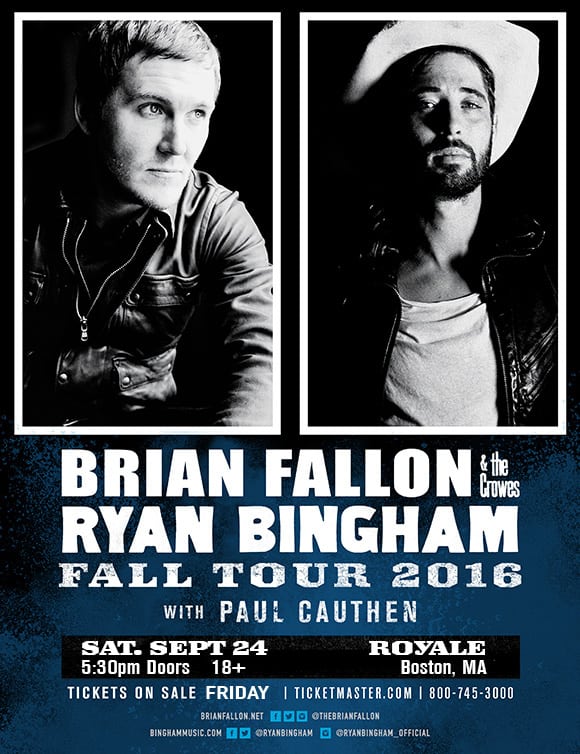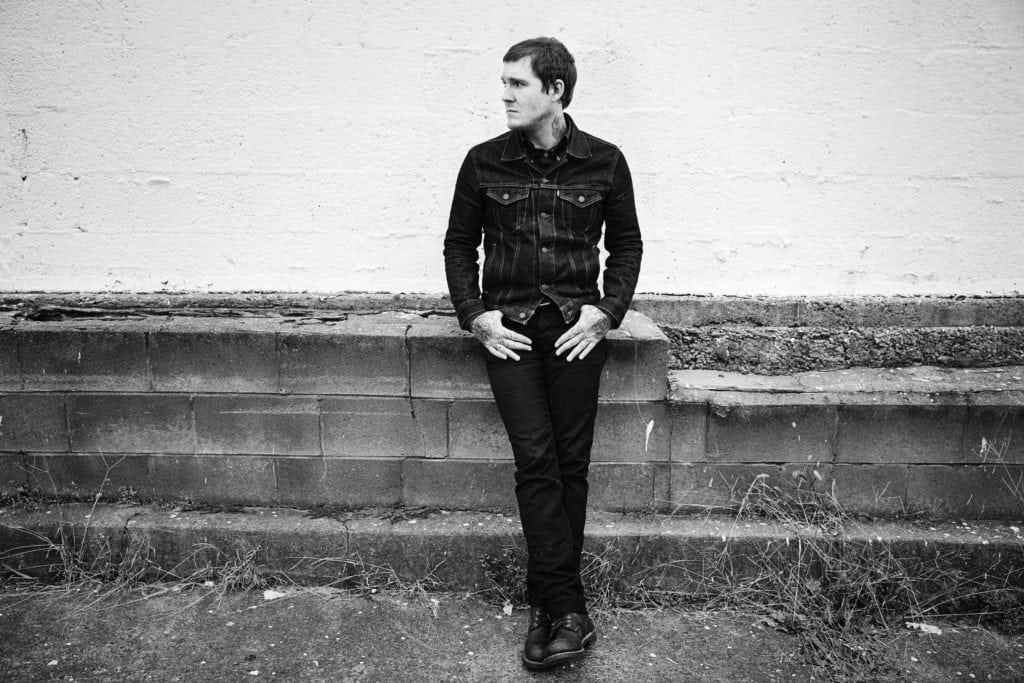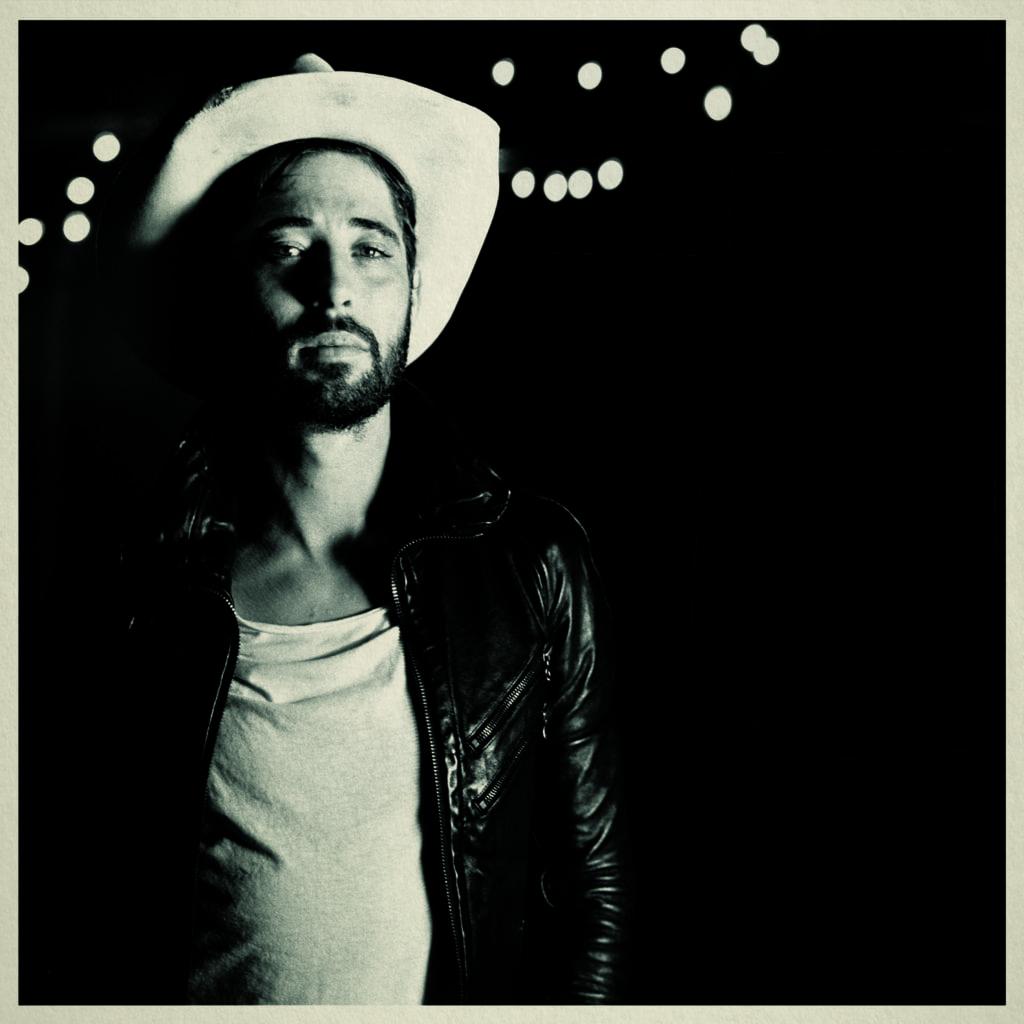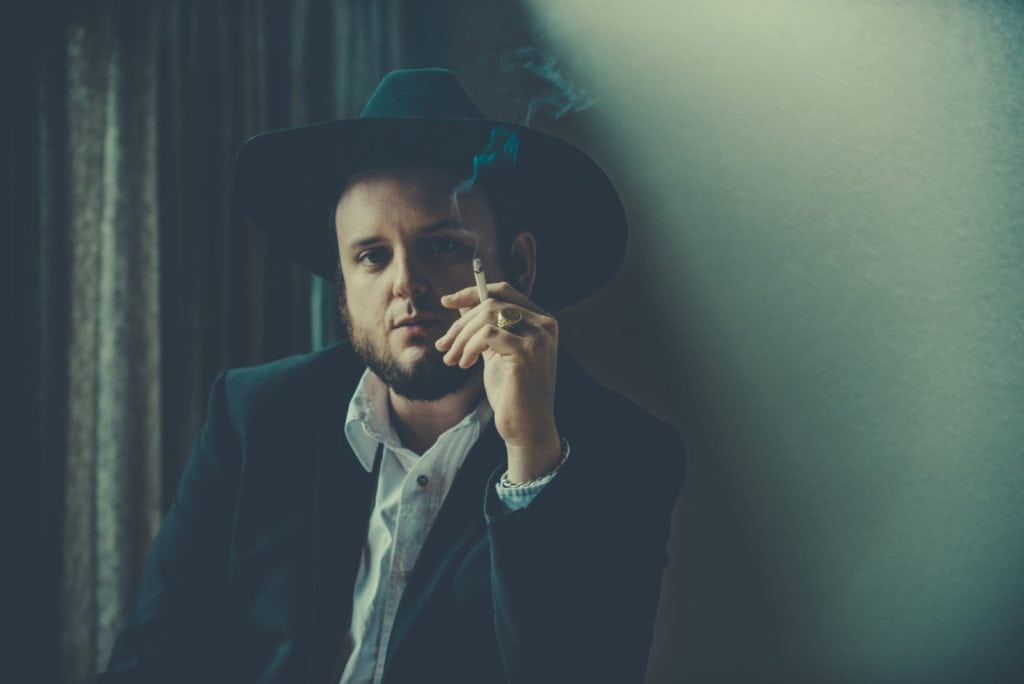Bowery Boston presents
Doors: 5:30 pm / Show: 6:30 pm
This event is 18 and over. Patrons under 18 admitted if accompanied by a parent or legal guardian.
Tickets on sale Fri. 7/29 at noon!
Tickets available at TICKETMASTER.COM, or by phone at 800-745-3000. No service charge on tickets purchased in person at The Sinclair Box Office Wednesdays-Saturdays 12-7PM. Please note: box office is cash only.
***
***
Brian Fallon & the Crowes
[Website] [Facebook] [Twitter]
“This one is different,” says Brian Fallon. “This one is mine.”
Bursting at its seams with huge hooks, big choruses, and enormous heart, PAINKILLERS marks the first solo album from Brian Fallon, known far and wide as singer/guitarist of the Gaslight Anthem, as well as such acclaimed outfits as The Horrible Crowes and Molly & The Zombies. Produced by studio superstar Butch Walker (Taylor Swift, Frank Turner, Keith Urban), richly textured songs like “Long Drives” and the addictive title track encompass the great rush and flow of American music, fusing sonic hits of heartland country and folk with hardcore punk energy and classic rock ‘n’ roll swagger. PAINKILLERS once again affirms the NJ-based rocker’s elemental gifts as a songwriter and storyteller, booming with insistent imagery, narrative craft, and the extraordinary emotional acuity that has informed his music since the very start.
“I’ve had this sound kicking around in my head for so long,” says Fallon, “but it took maturity to get it out.”
Fallon decided to begin work on PAINKILLERS immediately following the announcement of The Gaslight Anthem’s indefinite hiatus. Though his prior extracurricular projects were made under alternate band monikers, a dear friend suggested that this time perhaps he might think otherwise.
“She said I was limiting myself,” Fallon says. “’If you make a Horrible Crowes record, then you’ve got to make Horrible Crowes music. You have to float within those guidelines. But if you use your own name you can make any record, you can change throughout your career, work with different musicians, be whatever you want to be and then wrap it all together.’ That’s one of the best pieces of advice I’ve ever gotten.”
Solo or otherwise, Fallon knew he couldn’t make his record all alone. He considered a number of potential collaborators but again and again, Butch Walker’s name kept coming up as an ideal match. A meeting was arranged and the two musicians hit it off from the jump, tracking four demos in three days, including fleshed out versions of “Painkillers” and “Nobody Wins.”
“It was just like fast friends,” Fallon says. “All the sounds fell into place. There wasn’t any searching – it was all right there. We had a blueprint from the records we grew up on.”
Fallon set to work in September, spending three weeks at Nashville’s Taxidermy Studios backed by a crack outfit featuring Walker, Molly & The Zombies bassist Catherine Popper (Jack White, Ryan Adams & The Cardinals, Willie Nelson), and drummer Mark Stepro (Hayes Carll, Ben Kweller, Jackson Browne). Freed from any brand, Fallon felt
more comfortable and confident than ever before, unrestrained and able to fully articulate himself in the studio.
“I felt like I was doing exactly what I should be doing, at exactly the moment I should be doing it,” he says. “There was a very nice feeling, like, you’ve been working towards this record your whole career and here you are getting to do it.”
Fallon had spent much of the past decade pushing himself in different directions, challenging himself as a songwriter by trying on various guises and techniques. This being his solo debut, he decided to return to his initial path, cutting through the craft to simply write “couch songs” on his trusty acoustic guitar.
“I’d been trying different things for the past few years now,” Fallon says, “but there’s a path that I started on. I thought, let me go back to the very basics of where I started writing songs and maybe see if I’ve gotten any better. I know I haven’t mastered the craft but now that I’ve learned a bit, let me see what I can pull out now.”
Inspiration came, as it often does, from Fallon’s lifelong canon, specifically BORN IN THE USA and FULL MOON FEVER, milestone rock records unafraid to work as mass appeal pop statements. Classic sounds abound throughout PAINKILLERS, from the ringing Rickenbackers that drive “Among Other Foolish Things” to the shingled backing vocals that give lift and spirit to each of the album’s dozen songs. “A Wonderful Life” is perhaps Fallon’s greatest anthem thus far, a righteous slice of 60s-fueled dance party rock ‘n’ roll brought full stop into the new century.
“It’s got all the bits,” Fallon says, “the riff, the whoa-whoa-whoas, the chorus, the whole thing. It’s simple but we just knew right away that that one was something else.”
Other high spots include “Red Lights” and the intensely orchestrated “Long Drives,” both originally written and demoed by the country rock-inspired Molly & The Zombies but never properly recorded. Walker helped Fallon retrofit the Molly tunes by “straightening out the beat,” bringing them in from the front porch and placing them square on the boardwalk where they belong.
“I didn’t want to make a country record,” Fallon says. “I’m from New Jersey, not Nashville. But I thought those songs were too good to throw away.”
Fallon’s garrulous lyricism – as ever, ribboned with spot on setting, telling character study, and cultural references spanning “Famous Blue Raincoat” to DC post-hardcore heroes Rites of Spring – is more than matched here by his musical ambition, for the first time truly weaving his wide-ranging tastes into a distinctive and dramatic unified whole. Remarkably, PAINKILLERS was recorded with but one amp, the very same Tone King Imperial 20th Anniversary Edition Fallon used to record his initial demos.
“This thing does everything,” Fallon says. “Sounds like the Byrds when you plug in the 12-string, it rocks when you plug the Les Paul in, it does country, everything. I showed it to Butch and he was like, alright, cool, we’ll use your amp. He plugs into it, we recorded all the guitars for one song on it, he goes, wow, that amp’s pretty good. Let’s use it tomorrow. And that’s what we did. At the end of the session, Butch said to me, I don’t think I turned on another amp this whole time. It was awesome!”
Fallon – with Tone King Imperial in tow – plans to spend much of 2016 on the road, accompanied by a stellar combo comprised of The Gaslight Anthem guitarist Alex Rosamilia, The Horrible Crowes’ Ian Perkins, and the aforementioned Catherine Popper. With PAINKILLERS largely crafted in the studio, transitioning its songs to the stage offers yet another happy challenge.
“You just do it when you’re making a record,” Fallon says. “Then to play it live you kind of have to pull it all apart and put it back together again. So the songs take on a whole new life, which is the benefit of going to see a band live.”
The Gaslight Anthem will return, avows Fallon, but for the time being his focus is firmly locked on the present moment. For him, PAINKILLERS marks neither an end nor even a beginning – where he’s at now is all that matters.
“Pseudo-philosophically,” Brian Fallon says, “you really only have what’s in front of you today. That’s kind of where my head’s at with this. I’m doing this now, I’ve always wanted to do it, let’s see where it goes. And that’s kind of it.”
***
Ryan Bingham
Ryan Bingham needed some peace and quiet. Free of the burdens that had saddled him during the writing and recording of his recent albums, he relocated to an old airstream trailer tucked away in the mountains of California, camping out for several weeks and embracing the solitude to dig down deep and craft his most powerful album yet, ‘Fear and Saturday Night.’
“It gave me the space and time to tap into myself,” Bingham says of the experience. “Up there, it was totally isolated. No phones, no noise, no lights. At night the only thing you’d hear is the bugs and the coyotes. It’s lonely when you get back up in there and there’s nobody around, but for me, I kind of grew up that way in the middle of nowhere. Since I’ve started touring, I’m surrounded by people all the time, so getting back to the roots of everything, that’s really where I seem to find stuff that’s meaningful when I’m writing songs.”
Bingham was actually in the back of a van in North Dakota when he wrote ‘The Weary Kind,’ a song that became the centerpiece of the 2010 film ‘Crazy Heart’ starring Jeff Bridges. It earned him an Academy Award, a Golden Globe, and a Grammy, and skyrocketed him into the spotlight. Amidst the incredible success, though, was tragic loss behind the scenes that few knew about.
“A lot of peopled didn’t realize when that Oscar stuff was going on and ‘Junky Star’ was released, I was dealing with the loss of my parents,” says Bingham, who released the follow-up album ‘Tomorrowland’ as a direct reaction to the emotional turmoil that surrounded him. “My mother drank herself to death, and my father shot himself. I was also going through a huge transition with the band—we were breaking up—and I felt so lost playing with different musicians for the first time in years.”
There were positive changes in his life during that time, too, including his marriage, which serves as a frequent well of inspiration on ‘Fear and Saturday Night,’ particularly on tracks like “Snow Falls In June” and “Top Shelf Drug,” a Stones-esque rocker that’s bound to become a live favorite.
Bingham never really set out to be a musician, though. His mother bought him a guitar when he was 16 years old, and a neighbor taught him a mariachi tune. When he grew tired of playing the only song he knew, Bingham began penning his own music, discovering the writing process to be a therapeutic coping mechanism for dealing with the tumultuousness of his upbringing. His first performances were informal affairs in the backseats of cars with friends on the way to rodeos, where he was competing professionally on the weekends. Every now and then, Bingham’s friends would convince him to break out the guitar in a bar, and before he knew it, he had more gigs playing guitar than riding bulls.
Recorded mostly live with a brand new backing band and under the guidance of producer/engineer Jim Scott, ‘Fear and Saturday Night’ opens with “Nobody Knows My Trouble,” a loping, autobiographical ballad about trying to outrun a painful past and finding redemption both in the strings of a guitar and in hitting the road with the love of your life. “Adventures Of You And Me” is a slide-guitar and mariachi-tinged barn-

burner about a pair of misfits who travel the country together, while “Island In The Sky” again picks up the theme of travel as a means of salvation and escape.
“I feel like I’ve been traveling my whole life, even from when I was a little kid,” says Bingham. “Both of my parents were really bad alcoholics, and my dad could never keep down a job, so we never lived in the same town for more than a couple years. And even if we did, we’d move to different houses every other month. It felt like I lived out of a cardboard box growing up until I was old enough to buy my own suitcase, and then I was just running from everything.”
Bingham faces down his past with a poetic grace throughout the album. Lead single “Radio” is about coping with a darkness that doesn’t want to let go, searching for a safe place to make sense of your life and the strength to stay on the right track through it all, while “Hands of Time” deals with accepting what’s behind you and moving forward with grit and determination. On “Broken Heart Tattoos,” a wistful waltz written to an unborn child, he imagines what kind of parent he’ll become, singing, “Take your sweet time and walk a straight line in two / But don’t you be shy of your wilder side / Or be afraid to let loose / With broken heart tattoos.” Perhaps the most affecting moment on the album arrives in the title track, when Bingham sings, “I don’t fear nothin’ except for myself / So I’m gonna go out there and raise me some hell.”
“Certain things aren’t going to change,” he explains of the song. “You can’t run away or hide from the past. You have to live in it and deal with stuff and find your own way to overcome. The way I grew up,” he continues, “you had to develop a certain kind of toughness. Hanging with those guys on the rodeo circuits, you learn at an early age how to defend yourself. There’s lots of fights and rowdy bars and mean people out there. But if you’re smart enough to stay out of situations where other people can hurt you, you’re the only one who can really hurt yourself. That’s something I had to learn on my own.”
Those hard-learned lessons, through both good times and bad, helped make Bingham the man he is today. ‘Fear and Saturday Night’ is the most authentic, personal, and deeply moving portrait of that man we’ve heard yet.
***
Paul Cauthen
[Website] [Facebook] [Twitter]
Paul Cauthen remembers sitting alone in an Austin house after a weekend-long bender. A life making music seemed to be slipping away. Wide awake with nothing to lose, he fell on his hands and knees right there, bowed his head, and threw down a divine gauntlet.
“I dared Him,” Cauthen says, recalling his desperate challenge to God. “I said, ‘Use me. I’ll be a rag doll. Just put me out there, let’s go. I dare you.’”
Most people don’t plead in the form of a dare. That blend of vulnerability and brash confidence is part of what makes Cauthen and his music––which often hinges on the same paradox––so compelling. Whether it was by heavenly intervention or sheer force of will, Cauthen emerged with My Gospel (Lightning Rod Records), his mesmerizing full-length solo debut. Produced by Beau Bedford, the record is both an artistic and personal triumph. My Gospel captures a young artist in full possession of a raw virtuosity that must sometimes feel like a burden: If your singing takes listeners on white-knuckle rides and you write like a hard-luck Transcendentalist poet who abandoned the East Coast for the desert, you’d better do both. Anything else just wouldn’t feel like living. “I don’t know what else I’m supposed to do in life,” Cauthen says. “So I just kept on working. Even when I didn’t hardly have money to eat, my songs allowed me to get into the studios. I wrote my way into this thing.”
The album is called My Gospel, but make no mistake: These are songs about Earthly struggles to love, connect, and just get by. “I’m not super religious,” Cauthen says. “I don’t believe God is this guy wearing a white cloak who comes down with wings and beautiful sandals. I do believe that people are put into other people’s lives for reasons, and those reasons are unexplained. I believe that is God.”






